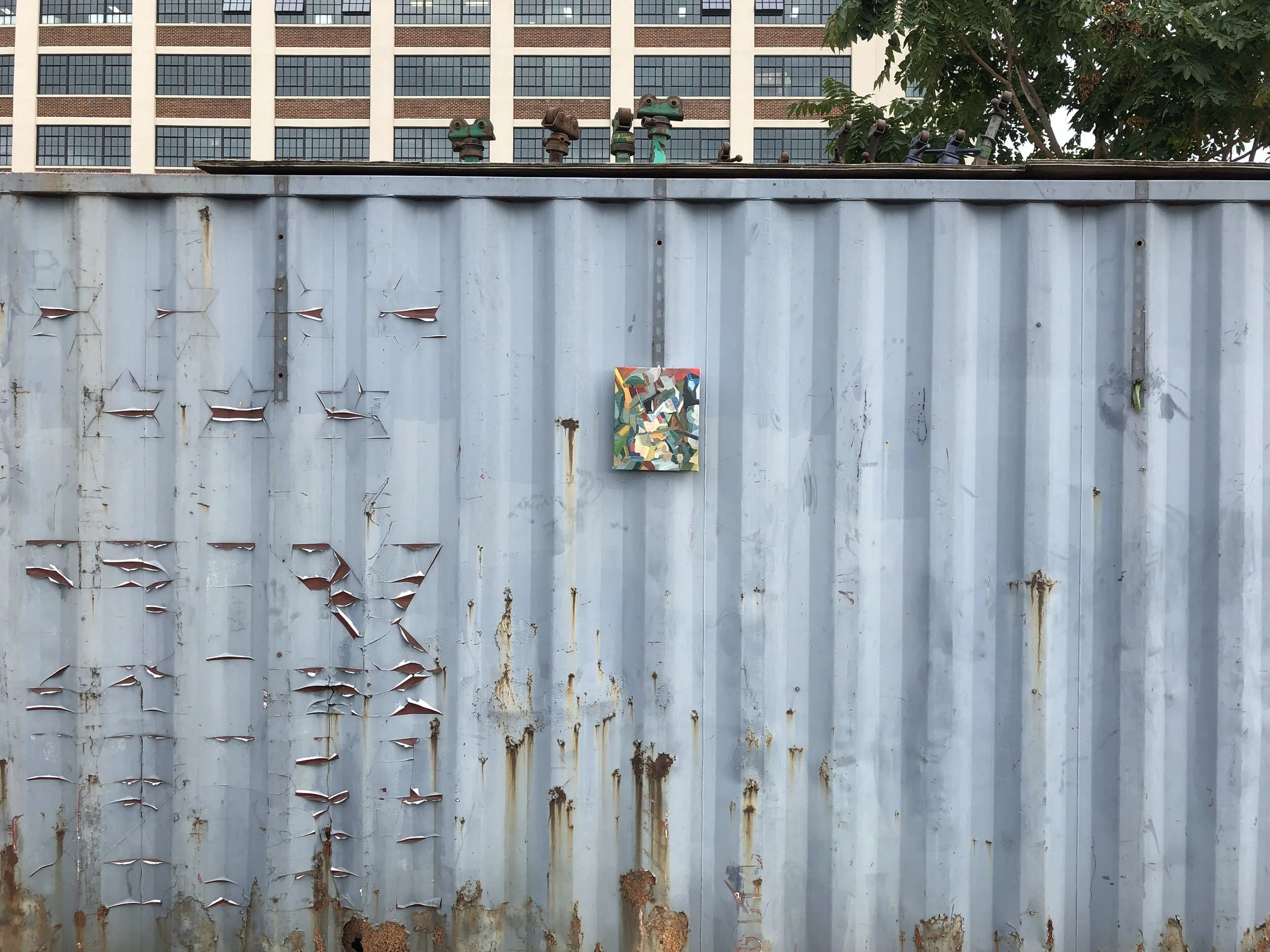Cultural Control
Cultural Control. Chris texted me so I might as well write about it.
One of my paintings on a shipping container from afar
When I lived in Japan, I moved in with a high school friend at first who helped me move into the country. I made many observations in the first weeks and I can’t remember what the topic was… actually, I remember.
It was about work and how my friend was planning to deal with it going forward, explaining how they enjoyed having a code to follow, essentially being told what to do and how to behave. To be told what’s most valuable and admirable in your community and to the whole society. It’s what you should aspire to, but it’s also a code of conduct and you can relieve yourself of decisions by following it closely, possibly leading to a happier life.
They had thought about what they enjoyed about work and decided they preferred it that way.
It reminds me of religion, stereotypically. Cultural control is comforting in the same way that rituals are, religious or otherwise. (Maybe ritual is just one category of cultural control when taken from the right perspective, and a context in which the concept is useful.)
It’s also like advertising. Both religion and advertising require you to sort of buy into a concept and identify with it, like “belief.” You believe, and in return, you get to live your life free from so many decisions—but also with less control.
Chopping an onion with an automatic onion chopper may be a harmless habit and save time, but what if you forget how to cut an onion, or the thought of cutting onions with other tools becomes emotionally distressing? This is the main criticism of cultural control.
When you buy into a certain way of doing things, the more thought and active decision-making you give up (or never had to begin with), the more stressful simple external changes in lifestyle can be, and the harder it is to relate to others that appear to resist your cultural codes or ideology.
I think most people, by virtue of being raised in a cultural context and socially demanding world, are to a degree operating by cultural control. When given choices, it is usually easier to go with what the culture recommends. The wider culture and the culture of your immediate family or colleagues. Your social context. It’s an internalized code that can and does affect what we most aspire to be.
Would I be focused on my career/business opportunities and look for most things in life from career and business relationships if I weren’t an American and raised by professionally oriented parents, going through the US school system, college, living in a big city, etc?
It's a dumb point to make, but it’s true.
One of my paintings on a shipping container at viewing distance
Let’s talk about Japan. It’s easier to see it in another culture. When you see a lot of people doing a lot of things you can’t understand, and you think:
“Wow, that’s really pointless.” “Why would anyone do that that way?”
Well, it’s not pointless to them. On a grand multicultural scale, however, there are definitely some things that are relatively pointless or at least create weaknesses in culture and society. There are (sociologically?) some threads/waves/mores/rules in culture that are not very helpful. They resist needed change and restrict the mental resources small groups of people use to cope with change, etc.
I guess it's a little broad, but cultural control may also describe some part of why everyone starts voting for authoritarians (relevant) and engaging politically through propaganda.
[In another way: when your work routines leave little time for raising children or exploring self-expression—or alternative careers if you like.]
Some places offer more complexity and more detailed cultural rules. Those places are better suited for those who prefer to live under cultural control for the majority of their needs. The same friend who helped me in Japan was a student with me in Minnesota, and Minnesota is another place with a high degree of cultural control. The professional class in Minneapolis is fueled by the Protestant ethics of persistent work and churning industrious routines that keep you perpetually occupied. Work is happiness, not any specific work, just any work.
You work whether you need to or not; it’s work for work’s sake, “idle hands” and all that. Socially, Minnesota had some things in common with Japan: you didn’t see what people really thought or who they were unless you knew them well and were around them enough to eventually hear about their concerns and struggles. That’s to a higher degree than in most cultures, I feel. You can be around people for a long time and not know what they think about anything.
Of course, it’s not necessary to know what people really think, but maybe that’s another conversation.
[In another way: among the wide spectrum of work cultures, a work culture offers control too in so much as it helps to enable work by using it.]
One of my paintings on a shipping container, close view with stars of stripping paint
The concern I’ve had about that is that some people focus very little on their internal life or developing personal views that can be shared outside their cultural clique. When you participate daily your whole life in any culture, or one with a lot of cultural control, you can safely live your life as a shell of a person, and no one will know that without the culture to guide you, you would be worse than lost, you would cease to have any identity.
It’s an easy thing to say. That people follow the culture to different degrees and some of them are shockingly hollow (to me). Maybe it’s related.
Think about how daily work is necessarily approached as if it’s easy. If you don’t treat tasks as if they can be expedient in some way, you will never complete them, and when you work for money, completing tasks is more important than putting in the energy to make the work excellent. This isn’t bad, it’s an efficiency people use to do things and share skills so they can earn a living.
That’s what cultural control is, too. Just like your average 9 to 5-er might struggle to create a business or write a book or become an artist. The person who lives systematically according to suggestions in the culture also cannot break from their prescribed life and perception of the world except by persistent practice or a great external pressure that affects a lot of people, makes their life hard, and demands a change in the culture.
Anyone who has visited Japan knows how much you can whittle down people's daily motions and interactions into social and cultural choreography, and it IS comforting, but it’s also true that anyone who has lived in a place like that knows how disturbing it can be when someone breaks the code.
I don’t think it’s always better to be a super-individualist and resist cultural control, but to do so is a simple way to force some level of creativity. People who do well with supplying their own answers to fill the gaps they make by rejecting the culture are going to be at least interested in the arts, if not pretty involved in something like that (as an artist, writer, designer…).
Two surefire things can help you become a great artist or creative:
Lots and lots of inherited money, ideally from parents who understand entrepreneurism, design, creative work, or something similar—you can do the work without needing to be paid for it, and while the rest of us are making guesses about how to succeed you will have already absorbed lessons from your parents about what’s important for success in your field
A strong personal need to break away from cultural control. Maybe you are a weird counter-culture cool kid (sure), maybe your origins are unusual and society doesn’t know how to label you, maybe you had personal obsessions that drew you out of the mainstream, or maybe you enjoy learning too much and what counts for work these days has proven to be hollow
When there’s a discontinuity between people and culture on a very large scale, then we see political change, social tension, and large communities either renewing themselves or new definitions and new identities.
When there’s a discontinuity between the culture and just one person or a very small group, you get new art and new creative people.
View of a full parking lot from an office above, in Winter near Minneapolis
Addendum
Other thoughts on cultural control, recorded quickly (simple example in daily life; example of how this concept comes up for me):
some guy in the neighborhood sees me loading some equipment into a Lyft/Uber
there’s always some low-key assessing going on
“is this white dude (me) just a privileged self-interested over-educated and overpaid wannabe New Yorker, …or is he a real guy?"
a lot of people look like one thing or another, but a little mix starts the gears winding. What are we looking at?
people project the ways they rely on the culture onto others so they can make sense of themselves, and sometimes the assumptions are really strong, especially when you consider that American culture dictates (ironically?) that we are not supposed to follow a script
if I point to some random person and speculate that they are droning through life exactly according to what the culture rewards or expects and rarely stepping out, I’m making a general statement about how many people are foregoing thought by largely submitting to cultural control
Thanks for reading
Note: I’m using this format where photos of paintings I’ve made can be used as images for blog posts, even if (as above) the text doesn’t openly acknowledge them or explain why they were chosen. Maybe I need a little line giving it a shoutout, or maybe not.
Newsletter signup below >.<
David
David Tompkins is an Artist, Writer, and Content Strategist
Short Comment and David Eli Tompkins Studio, New York, NY 10009
All images by David Tompkins
Painting pictured above: “Your Question Is A Measurement Of The Reality”





